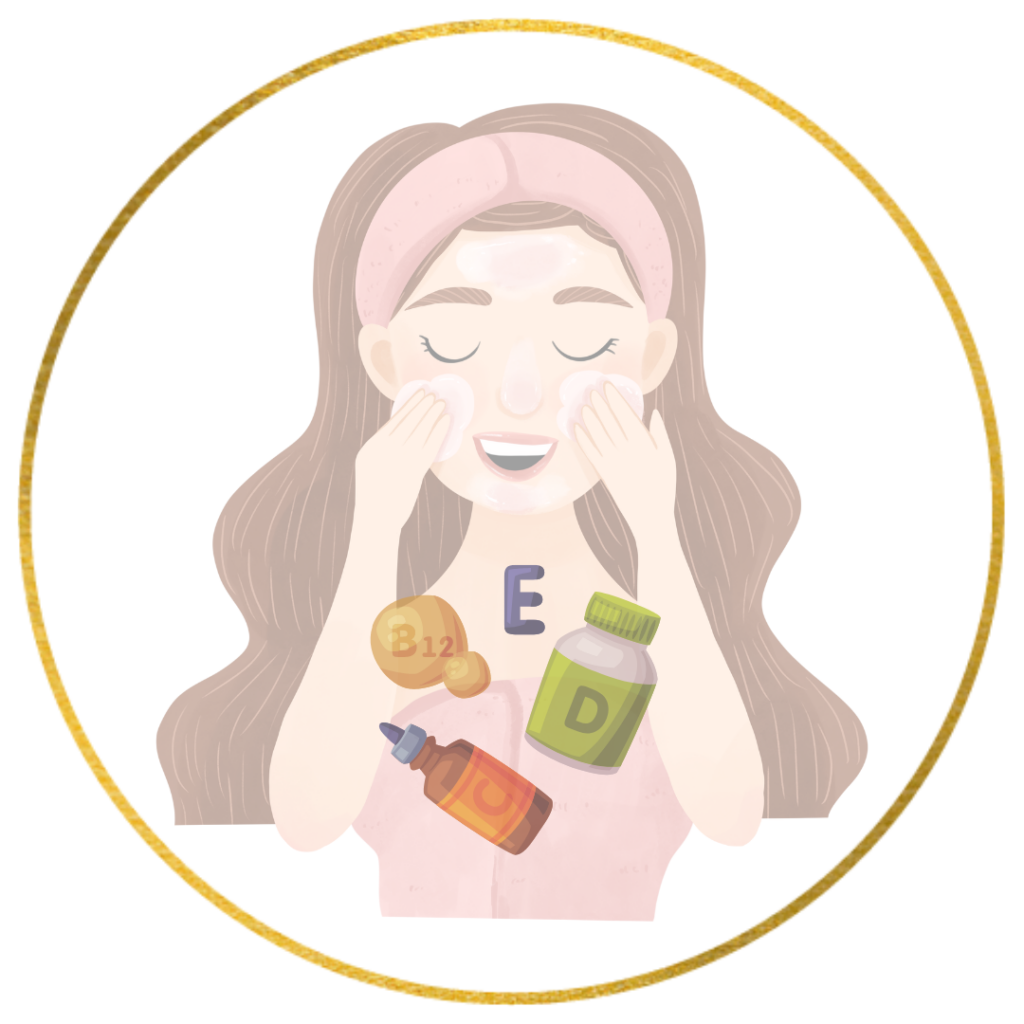Nutrition and Skincare
Your skin is your largest organ and it plays a vital role in your overall health and wellness. It protects what’s inside you by keeping water and nutrients in, while keeping harmful bacteria and viruses out. Your skin helps you maintain your body temperature and makes vitamin D when exposed to the sun. It’s also full of nerve endings to help you sense the outside world and avoid damage from things that are too hot, cold, or sharp. That is why it is important to know that these two, Nutrition and Skincare, go hand-in-hand.

Skin care isn’t only something we need to do on the outside. What we eat and drink affects all of our vital organs—including our skin. Here is a list of some of the essential nutrients you need to keep your skin [in top shape/nourished] so it can play its many fundamental roles and look its very best.
FOODS FOR YOUR SKIN
Your skin is a complex organ and needs a variety of different nutrients every day to stay healthy. Here are some of my top recommendations.
Water
You may not always think about water as an essential nutrient, but it is. Water plays many important roles in your body. It’s the main component in your cells and fluids. It allows you to maintain your body temperature and it provides shock absorption for your joints. It’s no wonder that adults are 60% water.
When it comes to our skin, water is just as essential. Your skin has three layers. The outermost layer—the one you see and feel—is called the epidermis. The middle layer is the dermis and underneath that is your hypodermis. When your epidermis doesn’t have enough water, your skin feels rough and loses elasticity. The water your epidermis needs comes from the inside. One clinical study found that when participants who didn’t drink a lot of water increased their intake, their skin became more hydrated and their skin’s “extensibility” improved within 2 weeks. Drinking more water can help skin hydration and may be particularly beneficial if you have dry skin or don’t drink enough water.
How much water do you need every day? According to the Mayo Clinic, women should aim for 2.7 L (11.5 cups) of fluids per day, while men should aim for 3.7 L (15.5 cups) per day. Note that these fluids can come from drinking water or other beverages, and can even come from water-rich foods like soups, fruits, and vegetables. Your personal water needs may be higher if you sweat a lot (from physical activity or living in a hot, humid environment), if you are pregnant or breastfeeding, or if you are prone to urinary or digestive tract conditions (kidney stones, vomiting, diarrhea). For a uniquely-you calculation on how much water to drink, do the water math equation.
Protein
Protein is an essential macronutrient which means you need quite a bit of it every day (more than with micronutrients like vitamins where you need much smaller amounts every day). Protein makes up parts of your cells, immune system antibodies, and the enzymes needed for thousands of reactions (including digestion). Your body’s main structure is also made from proteins. This includes your bones, muscles, organs . . . and skin. Different proteins are made by combining different building blocks called amino acids.
Your skin is made up of several different proteins. For example, collagen and elastin are very plentiful and build up the structure of your skin. Over time, and with exposure to the elements, your body’s ability to produce collagen decreases. Keratin is another important protein in your skin. Keratin makes up the outer epidermis layer giving it rigidity and enhancing its barrier protection.
The recommended daily amount of protein is based on your body weight. For every 20 lbs you weigh you should try to get just over 7 grams of protein each day. This means a person who weighs 140 lbs needs about 50 g protein/day, while someone who weighs 200 lbs would need about 70 g protein/day. Protein is found in meat, poultry, fish, dairy, and eggs. Plant-based sources of protein include soy, lentils, beans, nuts, seeds, whole grains, and even vegetables like corn, broccoli, and asparagus.
Essential fatty acids
There are two types of fatty acids that are essential nutrients for our health and our skin. They are linoleic acid (omega-6) and linolenic acid (omega-3). Omega-3 fatty acids in particular are antiinflammatory and have been linked to many health benefits including improvements in rheumatoid arthritis, ulcerative colitis, diabetes, heart disease, and psoriasis, to name a few.
A higher intake of linoleic acid is associated with lower levels of skin dryness and thinning as skin ages. On the other hand, a lack of fatty acids is linked to increased water loss from the skin, drying it out and causing weakness in the protective outer barrier.
You can get these essential fatty acids from eating fish (salmon, tuna), shellfish, nuts (walnuts), seeds (flax, chia, pumpkin, sunflower, sesame), oils (soy, canola), leafy vegetables, and avocados. [Essential fatty acids are also available in fish oil supplements which may contain additional vitamins and minerals.]
Vitamin C
Vitamin C is an essential nutrient and has several functions including making other nutrients more absorbable and available. It is a water-soluble antioxidant vitamin that plays many roles in your body, including in skin health.
A deficiency of Vitamin C (scurvy) results in skin lesions, as well as skin that is easily bruised and slow to heal. This is, in part, because of Vitamin C’s role in stabilizing the protein collagen. Another sign of Vitamin C deficiency in the skin affects hair follicles and can cause “corkscrew hairs.” These are examples of why Vitamin C is so important for skin health.
Every day you should aim for at least 75 mg of Vitamin C. Fruits and vegetables are rich sources In particular, bell peppers, citrus fruits (oranges, grapefruits), broccoli, cauliflower, strawberries, kiwis, blackcurrants, potatoes, rose hip, and parsley.
Vitamin E
Vitamin E is a group of essential vitamins called tocopherols. They are fat-soluble antioxidants that work synergistically with Vitamin C. When given together, vitamins C and E (and zinc) can speed up wound healing. Deficiency of Vitamin E is linked to red, dry skin.
Vitamin E is often applied directly (topically) on the skin to reduce redness and some of the effects of sun damage. Ingesting Vitamin E helps the skin from the inside by protecting collagen and fats from breaking down. One clinical study successfully improved symptoms of dermatitis (skin inflammation) in participants who took Vitamin E supplements over the course of several months.
The recommended daily allowance for Vitamin E (alpha-tocopherol) is 15 mg. You can get Vitamin E in vegetables, oils (wheat germ oil, olive oil, vegetable oil, sunflower oil), nuts (almonds, hazelnuts), spinach, broccoli, corn, kiwis, and soy.
Skin care beyond nutrition
While nutrition is essential, and I’ve covered my top 5 recommendations above, don’t forget other important skin care practices that help protect and nurture your skin.
- Use gentle cleansers and warm (not too hot) water to keep skin clean
- Moisturize after taking a shower or washing your hands
- Avoid things that bother your skin such as harsh cleansers, fragrances, and irritating fabrics
- If you have allergies or intolerances (e.g., to gluten or pollen), avoid those
- Limit your sun exposure and use sunscreen as appropriate (link sunscreen blog post here)
- Be physically active
- Try to get enough quality sleep
- Use a humidifier and wear gloves when the weather is dry and cold
- Avoid tobacco
The nutrients you consume feed your whole body—including your skin. As your largest organ with many critical roles, your skin needs a variety of different nutrients every single day. Water, protein and essential fatty acids are important macronutrients. While the antioxidant vitamins C and E are among some of the micronutrients your skin needs to heal and stay healthy.
In addition to nutrition, caring for the outside of your skin is also important. Using gentle cleansers, warm water, and moisturizers, and avoiding irritants and allergens will help. If you have any medical concerns with your skin, see your healthcare professional.
For a nutritious approach to skin health, I can help. Book a complimentary Clean Beauty 30-mins consult or sign up here to know more!
About me

For the last twenty years, I have helped people take charge of their health and feel better. I have been in your shoes - sick, tired, and overwhelmed by how to actionably care for myself. If you want to feel better, but don't know where to start, you've come to the right place. Learn More >
Subscribe
Sign up for my monthly newsletter for health and wellness tips!